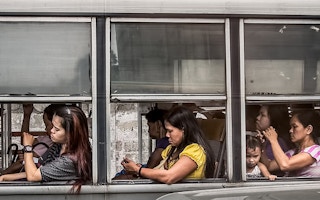When women have access to information and communication technologies, they can become more empowered to achieve many things, including better income through time-flexible jobs which they can do at home, access to free quality education, and wider access to funding to fuel their small businesses.
To continue reading, subscribe to Eco‑Business.
There's something for everyone. We offer a range of subscription plans.
- Access our stories and receive our Insights Weekly newsletter with the free EB Member plan.
- Unlock unlimited access to our content and archive with EB Circle.
- Publish your content with EB Premium.
Unfortunately, a wide gap exists between men and women being able to harness powerful technology tools like the Internet to their advantage.
To close this online gender gap, the United Nations’ Economic and Social Commission for Asia and the Pacific (ESCAP), in partnership with the UN Project Office on Governance (UNPOG) recently launched a new project aimed at developing better ways to deliver government services online that specifically respond to women’s needs.
Dubbed ‘E-Government for Women’s Empowerment,’ the project is the first of its kind in the region and aims to narrow the gender gap in the digital world, with new tools which governments can use to design, develop and deliver e-government services specifically for women.
The UN ESCAP said the online global gender gap grew from 11 per cent in 2013 to 12 per cent in 2016, with China, India, and Indonesia accounting for 45 per cent of the offline population, the majority of whom are poor, rural, older persons and women.
Research published by the Web Foundation last year also found that women in developing economies are nearly 50 per cent less likely to access the Internet than men in the same communities.
The study, which surveyed thousands of poor urban men and women in nine developing countries, showed that while the use of mobile phones among women was widespread, it did not equate to economic or social empowerment because of the low Internet use among women.
Only 37 per cent of women who used mobile phones had access to the Internet. Once online, women are 30 to 50 per cent less likely than men to use the Internet to increase their income or participate in public life, the study said.
“
With the shift towards digital government in Asia and the Pacific, it is vital to understand how governments can enhance their online services and participation to advance the 2030 Agenda, in particular, to achieve gender equality.
Shamshad Akhtar, under secretary-general for UN and executive secretary for ESCAP
The move by the UN to bridge the gender and digital divide is also a means to help achieve the 2030 Sustainable Development Agenda, which purports that the spread of information and communications technology has great potential to accelerate human progress.
UN Under Secretary General and Executive Secretary of ESCAP, Dr Shamshad Akhtar, said: “With the shift towards digital government in Asia and the Pacific, it is vital to understand how governments can enhance their online services and participation to advance the 2030 Agenda, in particular, to achieve gender equality.
She added: “To close gender gaps, ESCAP is developing tools to build the capacity of e-government to respond to the needs of women and promote gender equality for inclusive and sustainable development.”
The launch of the new tool underscores the important roles governments hold in achieving the SDGs.
UNPOG head Lim Jae-hong said: “The role of e-government as a tool for sustainable development is gaining importance not only in directly empowering women but also in achieving inclusive growth that provides economic and other opportunities to women in the Asia-Pacific region.”
The first part of the project aims to create awareness and develop the capacity of government officials involved in ICT, e-government policy making and services delivery by training them on the importance and impacts of empowering women through e-services.
The second part comprises researching best practices of how e-government services empowered women. Case studies from Australia, Fiji, India, the Philippines and South Korea will be featured.
ESCAP’s team of experts has concluded a review of the training module on October 5 and will release this online, along with the best practices case studies, early next year.










